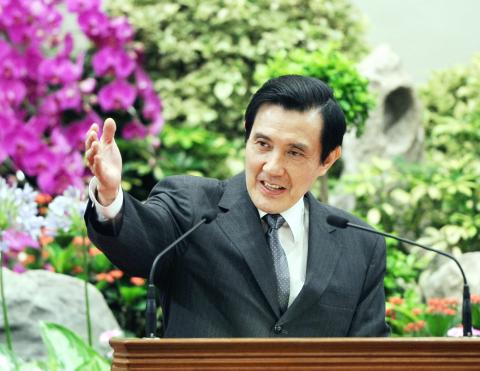President Ma Ying-jeou (馬英九) yesterday stressed the nation’s role as a regional peacemaker amid tensions between Taiwan and the Philippines over a shooting incident, and said the navy and Coast Guard Administration’s (CGA) joint patrol in the overlapping waters last week aimed to protect the safety of local fishermen, rather than being a military drill.
The combined exercise of the navy and CGA in waters about 164 nautical miles (304km) southeast of the southernmost tip of Taiwan — where the 15-tonne Taiwanese fishing boat Kuang Ta Hsing No. 28 was attacked by a Philippine Coast Guard vessel, leading to the death of fisherman Hung Shih-cheng (洪石成) — demonstrated the government’s determination to protect Taiwanese fishermen and allowed the Philippines to understand Taiwan’s stance, he said.
“Although it was a military exercise, we have no intentions of raising the tensions [between Taiwan and the Philippines]. However, our demands for the Philippine government to apologize and compensate will not change,” he said when meeting with Olivier Richard, director of the French Office in Taipei, in the Presidential Office.

Photo: CNA
Ma said the nation’s signing of a fisheries agreement with Japan last month protected the rights of fishermen in both countries and helped ease the tension in the East China Sea. He expected Taiwan and the Philippines to launch negotiations on fishery agreements soon and resolve the shooting incident.
“We’d like to engage in more exchanges with neighboring countries. Our fisheries agreement with Japan is having a positive impact on the East Sea, and the international community is welcoming such agreements,” he said.
Later, in an interview with Chinese-language broadcaster China Television aired yesterday, he said negotiations on a fishery agreement can still begin at any time, as such an agreement would provide fishermen from both sides with more guidelines and protection while operating in disputed waters.
“The incident is still under investigation, and we believe that the incident should be solved very soon,” he said.
When asked to comment on his low approval ratings in his fifth year in office, Ma said he has insisted on long-term reforms that would not receive applauds from the people in the short term, and said his administration will continue with the reform measures, including the government restructuring plans, pension reforms and tax reform for retired veterans, teachers and civil servants.
He acknowledged failing to carry out his “6-3-3” campaign pledge — annual economic growth of 6 percent, annual per capita income of US$30,000 and an unemployment rate of less than 3 percent per year — but said the government would not give up on those goals.
“The government is confronted with great challenges to meet the goals because of continuous global financial crisis. However, we haven’t given up on them, and we will work harder to realize the promise,” he said.

DEFENDING DEMOCRACY: Taiwan shares the same values as those that fought in WWII, and nations must unite to halt the expansion of a new authoritarian bloc, Lai said The government yesterday held a commemoration ceremony for Victory in Europe (V-E) Day, joining the rest of the world for the first time to mark the anniversary of the end of World War II in Europe. Taiwan honoring V-E Day signifies “our growing connections with the international community,” President William Lai (賴清德) said at a reception in Taipei on the 80th anniversary of V-E Day. One of the major lessons of World War II is that “authoritarianism and aggression lead only to slaughter, tragedy and greater inequality,” Lai said. Even more importantly, the war also taught people that “those who cherish peace cannot

STEADFAST FRIEND: The bills encourage increased Taiwan-US engagement and address China’s distortion of UN Resolution 2758 to isolate Taiwan internationally The Presidential Office yesterday thanked the US House of Representatives for unanimously passing two Taiwan-related bills highlighting its solid support for Taiwan’s democracy and global participation, and for deepening bilateral relations. One of the bills, the Taiwan Assurance Implementation Act, requires the US Department of State to periodically review its guidelines for engagement with Taiwan, and report to the US Congress on the guidelines and plans to lift self-imposed limitations on US-Taiwan engagement. The other bill is the Taiwan International Solidarity Act, which clarifies that UN Resolution 2758 does not address the issue of the representation of Taiwan or its people in

US Indo-Pacific Commander Admiral Samuel Paparo on Friday expressed concern over the rate at which China is diversifying its military exercises, the Financial Times (FT) reported on Saturday. “The rates of change on the depth and breadth of their exercises is the one non-linear effect that I’ve seen in the last year that wakes me up at night or keeps me up at night,” Paparo was quoted by FT as saying while attending the annual Sedona Forum at the McCain Institute in Arizona. Paparo also expressed concern over the speed with which China was expanding its military. While the US

‘FALLACY’: Xi’s assertions that Taiwan was given to the PRC after WWII confused right and wrong, and were contrary to the facts, the Ministry of Foreign Affairs said The Ministry of Foreign Affairs yesterday called Chinese President Xi Jinping’s (習近平) claim that China historically has sovereignty over Taiwan “deceptive” and “contrary to the facts.” In an article published on Wednesday in the Russian state-run Rossiyskaya Gazeta, Xi said that this year not only marks 80 years since the end of World War II and the founding of the UN, but also “Taiwan’s restoration to China.” “A series of instruments with legal effect under international law, including the Cairo Declaration and the Potsdam Declaration have affirmed China’s sovereignty over Taiwan,” Xi wrote. “The historical and legal fact” of these documents, as well